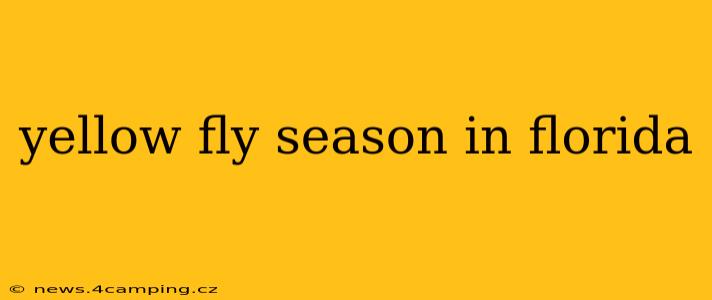Florida's warm and humid climate provides an ideal breeding ground for various insects, including the infamous yellow fly. These pesky biting flies can significantly impact outdoor activities and overall enjoyment of the Sunshine State, particularly during their peak season. Understanding their life cycle, habitats, and effective repellent strategies is key to minimizing their nuisance. This guide provides a comprehensive overview of the yellow fly season in Florida, answering many frequently asked questions.
What is the yellow fly season in Florida?
The yellow fly season in Florida generally runs from late spring to early fall, typically starting in April or May and lasting until September or October. However, the exact timing and duration can vary slightly depending on location and weather conditions. Warmer, wetter springs tend to lead to an earlier and more intense season. Coastal areas often experience longer seasons than inland regions.
Where are yellow flies most prevalent in Florida?
Yellow flies are found throughout Florida, but their prevalence varies geographically. They are particularly abundant in coastal areas and near bodies of water, such as marshes, swamps, and rivers. Areas with abundant vegetation and livestock are also attractive breeding grounds. While they might be encountered statewide, you’re more likely to experience significant infestations in the panhandle and along the coast.
What attracts yellow flies?
Yellow flies are attracted to several factors, making certain areas more prone to infestations than others. Understanding these attractants helps in preventative measures:
- Carbon Dioxide: Like many biting insects, yellow flies are drawn to the carbon dioxide humans and animals exhale.
- Movement: Moving objects, such as people and animals, are more likely to attract yellow flies than stationary ones.
- Dark clothing: Yellow flies are visually attracted to dark colors. Wearing light-colored clothing can help reduce bites.
- Moisture: Moist, humid environments are ideal for breeding and survival.
- Livestock: Areas with livestock often have high populations of yellow flies, as they feed on the blood of mammals.
How long does a yellow fly bite last?
The duration of a yellow fly bite's effects varies depending on individual sensitivity. For most people, the itching and redness typically last a few days to a week. However, some individuals may experience more prolonged or severe reactions. Severe reactions are uncommon but might involve swelling, blistering, and even an allergic reaction in rare cases.
Are yellow flies dangerous?
While generally not dangerous, yellow fly bites can be quite irritating and uncomfortable. Their bite is painful, often leaving a raised, itchy welt. Although they are not known to carry diseases in Florida, it's crucial to avoid scratching the bites to prevent secondary infections. In rare cases, individuals might experience allergic reactions requiring medical attention.
How can I prevent yellow fly bites?
Protecting yourself from yellow flies involves a multi-pronged approach:
- Repellents: Use insect repellents containing DEET, picaridin, or IR3535. Always follow product instructions.
- Clothing: Wear light-colored, long-sleeved shirts and pants when in areas where yellow flies are prevalent.
- Timing: Limit outdoor activities during peak yellow fly activity times, typically dawn and dusk.
- Screening: Install screens on windows and doors to prevent flies from entering your home.
- Fans: Use fans to create air movement, which can deter yellow flies.
What is the best insect repellent for yellow flies in Florida?
Several effective insect repellents can be used against yellow flies. Products containing DEET, picaridin, or IR3535 are generally recommended. Always choose a repellent that is appropriate for your skin type and follow the manufacturer's instructions carefully. Read reviews and choose a product that aligns with your needs and preferences.
By understanding the yellow fly season and taking preventative measures, Floridians and visitors can enjoy the outdoors with fewer interruptions from these biting insects. Remember that these pesky flies are part of Florida's ecosystem, and responsible management practices are crucial for co-existence.
